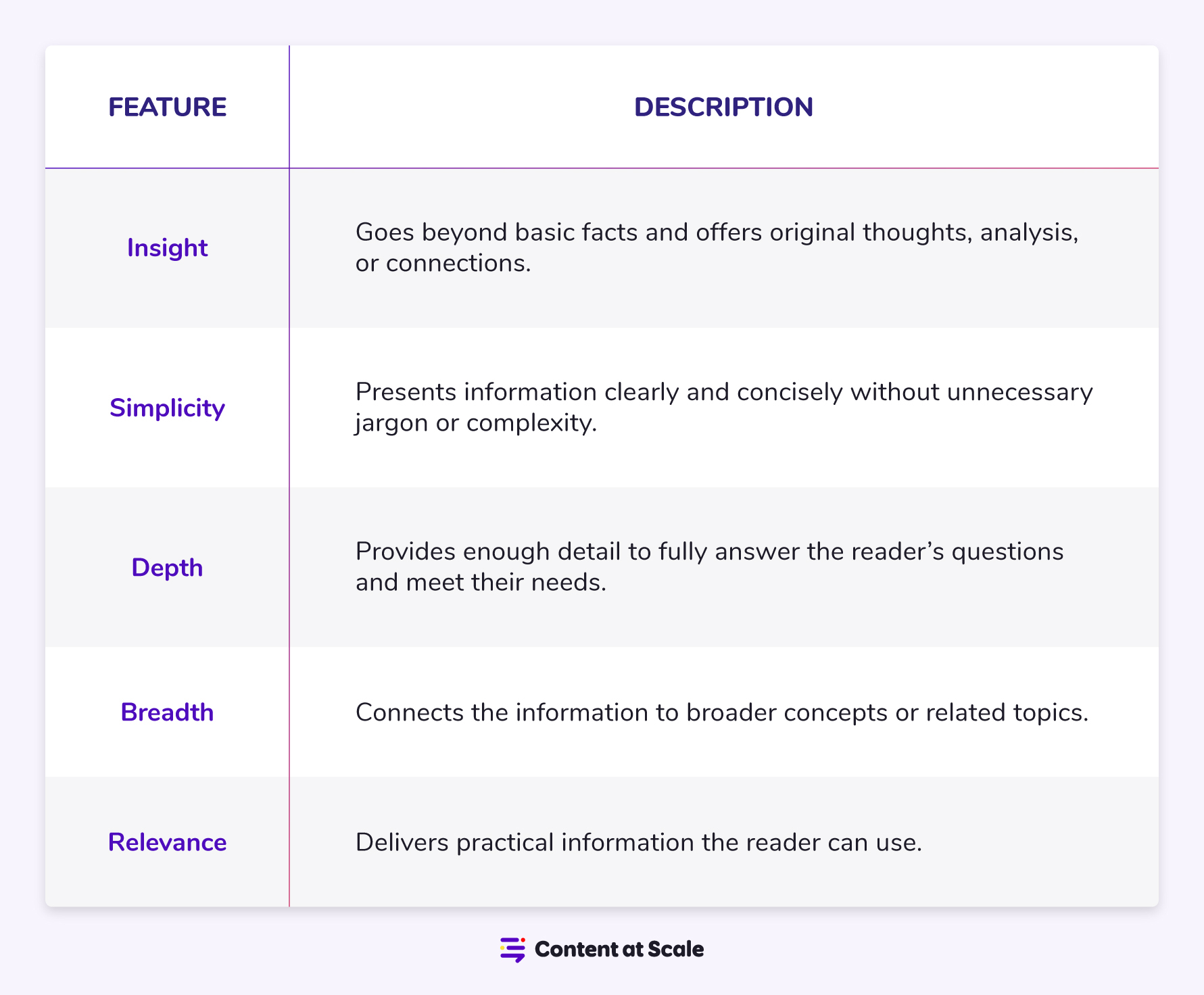As digital marketers and content creators, we know the importance of authoritative content.
Getting your content to rank in search isn’t as simple as hitting “publish.” To truly connect with readers and rank well on Google, your content must establish you as an expert they can rely on.
But what does authoritative content even mean?
Let’s break down what authoritative content is and how to make it work for you.
Table Of Contents:
- Google and The Importance of Authoritative Content
- EEAT and the Future of Search
- What Defines Authoritative Content?
- Why Building Authority Matters More Than Traditional SEO
- Examples of Authoritative Content
- Build Authority to Improve Conversions
- How to Create Authoritative Content
- Authoritative Content in the Age of AI
- FAQs: The Importance of Authoritative Content
- Conclusion
Google and The Importance of Authoritative Content
Let’s face it, Google sets the rules for the internet. (Yes, Bing, Yahoo, and DuckDuckGo exist, but Google accounts for 82% of searches globally)
The reality is that if you want to be found online, you have to play by Google’s rules.
What are those rules?
Essentially, Google wants trustworthy, high-quality content that genuinely helps people.
The search engine giant rewards websites that follow these guidelines with better visibility and organic traffic.
EEAT and the Future of Search
Back in the early days of SEO, stuffing keywords into a website was enough to get noticed.
Thankfully, things have changed. Now, with each algorithm update, Google is getting smarter. It’s more focused on rewarding quality content created for real people.
A perfect example of this shift is the introduction of the E-E-A-T principle.
E-E-A-T, which stands for Experience, Expertise, Authoritativeness, and Trustworthiness, is how Google measures how reliable and informative content is.
It helps the search engine understand the purpose and quality of content so they can better serve users.
Google judges content on:
- The firsthand experience of the creator
- The expertise of the creator
- The authoritativeness of the creator, the content itself, and the site
- The trustworthiness of the creator
Google has also said that it is looking for reliable people-first content, with the following guidelines:
That’s the kind of stuff you’d actually find in a reputable publication: fact-checked and free of blatant errors.
What Defines Authoritative Content?
As Darrell Mordecai of Similarweb notes, discussions about “authoritative content” often center on buzzwords like YMYL (Your Money, Your Life) and E-E-A-T.
But at its core, authoritative content is valuable, accurate, and insightful. It’s written by experts or backed by reliable sources.
Ultimately, authoritative content delivers on its promise to provide real value to the reader.
Authoritative content has 5 key features:

This is the importance of authoritative content: giving your audience more than just the bare minimum.
Why Building Authority Matters More Than Traditional SEO
The internet has fundamentally transformed how people access and engage with information.
Simply churning out blog posts or articles optimized for keywords no longer cuts it.
Instead, we must provide insightful, comprehensive, and valuable content to capture and hold the interest of our audience.
That’s where the true importance of authoritative content lies. It moves beyond ticking an SEO checklist and tackles the bigger picture: fostering lasting connections. This includes elements like consistent high-quality writing and clear attribution.
You also need credentials to support your content, especially when addressing YMYL topics.
YMYL, short for your money your life, relates to topics that impact your health, happiness, finances, and safety.
It might sound counterintuitive, but focusing less on manipulating search engine rankings helps your content reach a wider audience. This method establishes your presence as a reliable, reputable, and trustworthy source of information in your field.
Why does any of this matter for SEO?
If you create incredible content that offers genuine value, people are more likely to spend time on your site. They’ll also be more likely to engage with your brand and share your content on their social networks.
People may even recommend your brand to their personal networks. These natural endorsements make all the difference to Google.
Google can see that you’re providing something special that’s truly resonating with people. You’ve got trustworthiness and authenticity.
This also leads to higher engagement (comments, likes, shares, etc.).
When Google sees that “Wow, people are really digging this,” your organic reach expands far beyond just ticking those SEO boxes.
Examples of Authoritative Content
What does Google consider as authoritative content?
- Tutorials and listicles that help people complete tasks (like how to fix a leaky faucet or bake a cake).
- In-depth blog posts or long-form articles that provide a deep dive into specific topics.
- Case studies that demonstrate how your product or service has helped real people.
- Buyer’s guides that help shoppers make informed purchasing decisions.
- Videos that offer clear explanations, demonstrations, or engaging storytelling.
- Timeless “evergreen content” covering consistently relevant information.
What these content types have in common is their focus on offering genuine help to real humans. If you keep that in mind, you’ll be well on your way to making content that both users and search engines will love.
Build Authority to Improve Conversions
Building authority with quality content has real, tangible benefits. For businesses and entrepreneurs, establishing thought leadership with well-researched, expertly crafted content isn’t just a bonus — it’s essential for growth.
According to a report from Edelman and LinkedIn, 54% of decision-makers purchased a new product or subscribed to a new service after engaging with a piece of thought leadership from a company.
Think about brands like ESPN, which offers insightful sports news and analysis. Or AdvisorStream, which curates expert financial insights. Both of these companies build trust with their audiences. People are more likely to become loyal followers, clients, and customers if you provide valuable insights.
Think of it this way: authoritative content can act as a digital storefront. It showcases your knowledge and expertise, but also your ability to solve problems and create trust.
This is incredibly beneficial if you’re doing affiliate marketing.
The importance of authoritative content increases substantially if your website profits from recommending or showcasing the value of another person’s brand.

Creating this trust can mean the difference between a bounce and a conversion.
You’ll want a user-friendly website free of those annoying distractions that make readers click away immediately.
You know what I’m talking about: tons of ads and clickbait that just scream “shady.”
Keep it classy with simple designs, well-structured content, clear calls to action, and genuine, relatable writing to establish your authority. This will make people want to come back for more.
When readers trust you, they’re more inclined to believe what you say about a product or service. They might even be more likely to agree with your perspective. This increases the likelihood that they’ll follow through on your suggestions.
Authoritative content works behind the scenes, silently boosting your credibility, engagement, and ultimately, your bottom line.
How to Create Authoritative Content
Readers crave it. Google rewards it.
Authoritative content sets you apart as a trusted voice.
But writing it? That’s where the magic happens.
Creating authoritative content is more than just sharing accurate information. You want your readers to see you as the go-to source in your niche.
So how do you make that happen?
First, know your audience inside and out.
What keeps them up at night? What questions do they desperately need answers to? This is how you build content that truly resonates.
Next up, back up your claims. Don’t just say something is true – prove it. Use data, research, and relevant statistics.
And don’t be afraid to link to other reputable sources. This shows you’ve done your homework.
Now, let’s talk about readability.
Even the most well-researched content falls flat if it’s hard to digest. Keep your language clear and concise. Use headings, subheadings, and bullet points to make your content scannable.
Because nobody wants to read through walls of text.
Authoritative Content in the Age of AI
AI-generated content has exploded in popularity in the last two years.
Thanks to long-form content writers like RankWell, you can now write thought leadership pieces with minimal effort and start ranking in Google.
Check out this example of authoritative content written by AI.
This 2,000-word blog post was generated by AI in less than 10 minutes! All I had to do was enter a long-tail keyword and the AI wrote a baseline draft for me.
Although the output covers the topic in-depth and even comes with quotes and external links, relying on AI to do it all is never good practice especially when publishing authoritative content.
For one, AI-generated content doesn’t have that crucial “human touch” that is necessary to incorporate EEAT and build credibility.
Plus, you have to be cautious – AI isn’t always right.
AI tools aren’t foolproof. They can provide inaccurate information (case in point: two New York lawyers got in trouble for using a ChatGPT-written legal brief that cited entirely fake cases).
If you’re worried about plagiarism as AI often draws heavily on existing works, BrandWell has recently added a plagiarism checker to its suite of SEO tools to help you detect and rewrite identical content.
Don’t let a desire for shortcuts undermine your hard work in creating a strong online presence. Instead, think of AI as a starting point. Use these tools for research assistance or to brainstorm ideas, but always bring your expertise to the table.
Write in your authentic voice and share genuine personal experiences to ensure your content stands out. Google is looking for first-hand knowledge that algorithms simply cannot replicate.
FAQs: The Importance of Authoritative Content
What is authoritative content?
Authoritative content refers to information that is reliable, accurate, and trustworthy, typically backed by expertise, research, or recognized authority in a subject area.
What is the use of authoritative sources?
Authoritative sources are used to ensure credibility and reliability of information, helping to establish trustworthiness and accuracy in research, journalism, and decision-making processes.
How can you tell if a website has strong topical authority?
There are a couple of quick indicators. Sites with high domain authority will show up on the first page for topics within their niche. Take a look at their backlink profile, too. If those links come from diverse and reputable sources, you know they’ve gained serious respect in their field.
Conclusion
The importance of authoritative content in SEO cannot be overstated.
Content marketing hinges on quality content that meets readers’ needs and showcases deep knowledge about a given subject matter.
It’s how you rise above the online noise, forge deeper connections, and cultivate loyal audiences.




